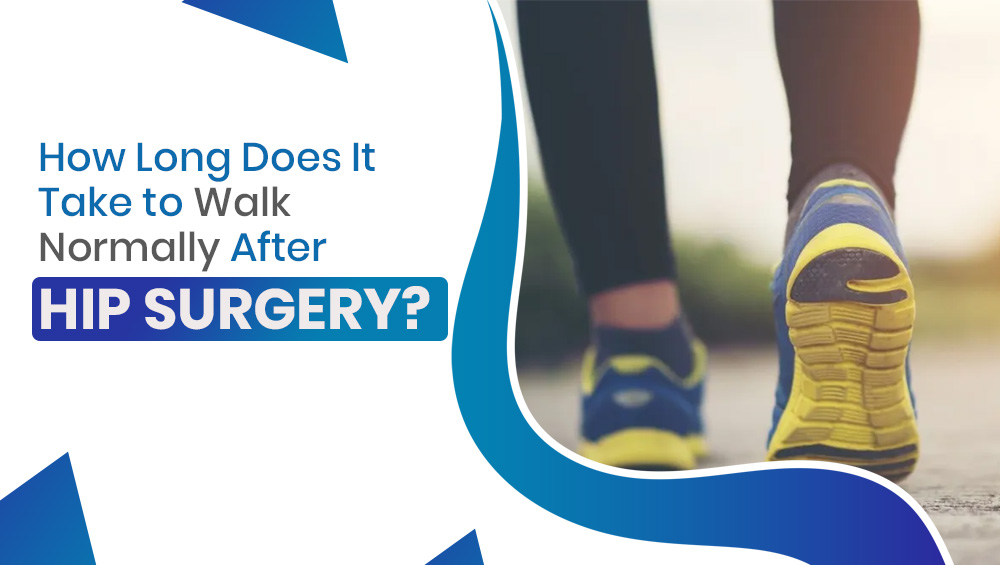Hip replacement surgery is a highly successful procedure that relieves chronic hip pain and restores mobility. One of the most common questions patients ask is:
“After hip surgery, when will I be able to walk normally again?”
In most cases, patients begin walking the same day or next day after surgery with support. Normal unaided walking typically returns within 3–6 weeks, depending on age, fitness, surgical technique, and rehabilitation progress.
Understanding Hip Replacement Recovery
Hip surgery recovery is gradual and milestone-based. While the artificial joint is stable, muscles, ligaments, and surrounding tissues need time to heal and strengthen.
Key goals of recovery include:
-
Pain reduction
-
Restoring joint movement
-
Improving balance
-
Regaining walking confidence
Following physiotherapy and surgeon guidance is essential for safe recovery.
Types of Hip Replacement Surgery & Walking Recovery
1️⃣ Direct Anterior Approach
-
Incision from the front of the hip
-
No major muscle cutting
-
Faster recovery
-
Earlier walking independence
2️⃣ Posterior Approach
-
Incision from the back of the hip
-
Muscles are cut and repaired
-
Slightly longer rehab needed
Both approaches are effective — recovery speed differs mainly due to muscle healing time.
Walking Timeline After Hip Surgery
Here’s a general recovery walking timeline patients can expect:
Day 0–1
-
Standing & walking with walker
-
Full weight bearing (as tolerated)
Week 1
-
Walking indoors with walker
-
Transition to cane may begin
Week 2–3
-
Walking short distances without support at home
-
Cane used outdoors
Week 4–6
-
Walking unaided for most patients
-
Improved balance & endurance
Beyond 6 Weeks
-
Longer walks
-
Stairs & outdoor mobility improve
Walker → Cane → Normal Walking
Most patients follow this progression:
-
Walker – First few days
-
Cane – 1–3 weeks
-
Unaided walking – Around 1 month
Correct Cane Use Tip
-
Hold cane in opposite hand of operated leg
-
Move cane + operated leg together
-
Step forward with stronger leg
Role of Physiotherapy in Walking Recovery
Physiotherapy is critical for regaining normal walking.
It helps with:
-
Muscle strengthening
-
Balance training
-
Gait correction
-
Endurance building
Therapy usually starts immediately after surgery and continues for several weeks.
Exercises That Help You Walk Normally Faster
Common rehab exercises include:
Standing Hip Abduction
Leg side lift to improve stability
Standing Knee Raises
Builds hip flexor strength
Hip Extensions
Strengthens gluteal muscles
These are done under physiotherapist supervision.
Signs You’re Walking Too Much
Overwalking can delay healing.
Watch for:
-
Groin or thigh pain
-
Increased swelling
-
Fatigue
-
Limping
If symptoms appear → rest, ice, elevate leg.
When Can You Walk Without Support?
Most patients walk independently within 3–6 weeks.
However, this depends on:
-
Age
-
Fitness level
-
Surgical technique
-
Muscle strength
-
Rehab compliance
Your surgeon or physiotherapist will confirm when it’s safe.
Tips to Improve Balance & Gait
To normalize walking pattern:
-
Do hip & core strengthening
-
Practice single-leg balance
-
Walk on treadmill (controlled setting)
-
Stretch regularly
-
Increase walking distance gradually
Returning to Daily Activities
Walking recovery supports return to:
-
Office work
-
Shopping
-
Driving
-
Social activities
High-impact sports take longer clearance.
Risks of Walking Too Early or Too Much
Overactivity may cause:
-
Pain flare-ups
-
Implant stress
-
Muscle strain
-
Risk of falls
Gradual progression is safest.
When to Consult Your Surgeon
Seek medical advice if you notice:
-
Severe pain
-
Persistent swelling
-
Limping
-
Fever or redness
-
Difficulty weight bearing
These may indicate complications.
Long-Term Walking Goals After Hip Replacement
Ultimate aim:
-
Walk pain-free
-
Restore natural gait
-
Resume hobbies
-
Improve fitness
Many implants last 20–30 years, allowing long-term mobility.
FAQs – Walking After Hip Surgery
How long does it take to walk normally after hip surgery?
Most patients walk normally without support in 3–6 weeks, though full strength recovery may take 3 months.
When can I walk without a walker after hip replacement?
Walker is used for a few days to 1 week, then replaced by a cane before unaided walking.
Does physiotherapy help in faster walking recovery?
Yes. Physiotherapy improves strength, balance, and gait — accelerating recovery.
Is it safe to walk immediately after hip surgery?
Yes. Patients are encouraged to walk the same day with support to prevent stiffness and clots.
What slows down walking recovery?
Obesity, weak muscles, infection, poor rehab compliance, or complex surgery.


